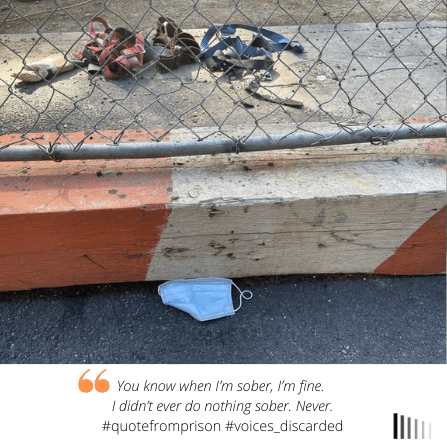Voices Discarded: an eco-social project of empathy & listening
Writing from prison paired with photographs of face masks tossed, lost, and discarded.
Voices Discarded is look at the link between the litter of discarded face masks, and incarceration.
This project centers on the metaphorical comparison of what and who we categorize as “discardable.”
About Voices Discarded
The impact of the pandemic still ripples into every corner of the globe. The alarming number of littered face masks, 7 billion globally, will take up to 450 years to decompose.
Face masks as much protect us as hide us. They make us invisible, and in some ways — unseen. Also invisible, unseen, and hidden long before the pandemic, are people in prison who are 550% more likely to get every variation of COVID-19 and 300% more likely to die from it.* Their vulnerability is due to the tight living quarters in prison, limited testing, and limited healthcare inside.
Voices Discarded is a photographic odyssey through writing from people in prison paired with images of tossed, discarded, and lost face masks. These are remnants of the COVID-19 pandemic. This collection of 1000s of photographs will unfold over time.
The project addresses the complete landscape of who's left out and left unseen in the margins. It addresses who the discarded are and who's unremembered.
We hope this collection draws attention to the need for a collective care and tending of our environment and also for people in prison. Now 2 million people in prison, this is a 500% increase over the past few decades.
We hope these images and writing will spark conversations about our collective responsibilities and priorities, and also empathy towards those who are marginalized in society, to help us all remember the unremembered.
Voices Discarded is a chance to listen and hear voices that haven't been heard.
# # #
Voices Discarded is a photo essay and collection created and compiled by Deborah Jiang-Stein, founder of unPrison Project and author of Prison Baby: A Memoir
* This is according to a recent study from researchers at Johns Hopkins University and UCLA.














